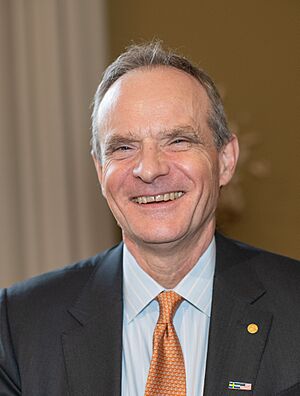Simon Johnson (economist) facts for kids
Quick facts for kids
Simon Johnson
|
|
|---|---|

Johnson in 2024
|
|
| Chief Economist of the International Monetary Fund | |
| In office March 2007 – August 31, 2008 |
|
| President | Rodrigo Rato Dominique Strauss-Kahn |
| Preceded by | Raghuram Rajan |
| Succeeded by | Olivier Blanchard |
| Personal details | |
| Born | January 16, 1963 Sheffield, United Kingdom |
| Education | Abbotsholme School |
| Alma mater | |
| Academic career | |
| Field | Political economy Development economics |
| Doctoral advisor |
Rudiger Dornbusch |
| Awards | Nobel Memorial Prize in Economic Sciences (2024) |
| Information at IDEAS / RePEc | |
Simon H. Johnson (born January 16, 1963) is a British-American economist. An economist studies how people, businesses, and governments make choices about money and resources. Since 2004, he has been a professor at the MIT Sloan School of Management. From 2007 to 2008, he was the main economist for the International Monetary Fund (IMF). The IMF is an organization that works to keep the world's money system stable.
In 2024, Simon Johnson, along with Daron Acemoglu and James A. Robinson, won the Nobel Memorial Prize in Economic Sciences. They received this award for their studies comparing how different countries become rich or poor. Their work helps us understand why some nations are more successful than others.
Contents
Education and Early Life
Simon Johnson was born in 1963 in Sheffield, United Kingdom. He attended Abbotsholme School in Rocester. After that, he studied Philosophy, Politics, and Economics at the University of Oxford. He earned his first degree there in 1984.
He then went on to get a master's degree in economics from the University of Manchester in 1986. Later, he studied at the Massachusetts Institute of Technology (MIT). There, he earned his PhD in economics in 1989. His main teacher at MIT was Rudiger Dornbusch.
Career and Important Work
After finishing his studies, Johnson worked at Harvard University for a few years. From 1991 to 1997, he taught at Duke University. He also helped direct a business center in Saint Petersburg, Russia. In 1997, he joined the faculty at MIT. He became a tenured professor there in 2002. This means he has a permanent teaching position.
At MIT, he helps lead the "Shaping the Future of Work Initiative." This group studies how jobs and work might change in the future. He also heads the Global Economics and Management Group.
Understanding Economic Systems
Simon Johnson has done a lot of research on how countries' economies work. He studies why some countries grow and others face challenges. He also looks at how technology affects jobs and society.
He has written several important books. One of his books, 13 Bankers: The Wall Street Takeover and the Next Financial Meltdown (2010), talks about big banks and financial crises. He wrote this book with James Kwak. They also started an economics blog called The Baseline Scenario.
Another book, White House Burning: Our National Debt and Why It Matters to You (2013), explains national debt. He also wrote Jump-Starting America: How Breakthrough Science Can Revive Economic Growth and the American Dream (2019) with Jonathan Gruber. This book explores how new science can help the economy.
Power and Progress
In 2023, Simon Johnson co-authored the book Power and Progress with Daron Acemoglu. This book looks at the history of technology and its effects on society. It asks important questions about new machines and how they impact people's jobs and wages.
The book suggests that new technologies don't always benefit everyone equally. Often, the advantages go to a small group of powerful people. It also shares a careful view of artificial intelligence (AI). The authors believe AI could have a negative effect on jobs and even on democracy.
Acemoglu and Johnson also offer ideas on how technology can be used for good. They suggest ways to make sure technology helps everyone. Their ideas include changing how markets work, breaking up very large technology companies, and investing in workers. They also talk about protecting people's privacy and data.
See also
 In Spanish: Simon Johnson para niños
In Spanish: Simon Johnson para niños
- Colonial Origins of Comparative Development
 | Frances Mary Albrier |
 | Whitney Young |
 | Muhammad Ali |


